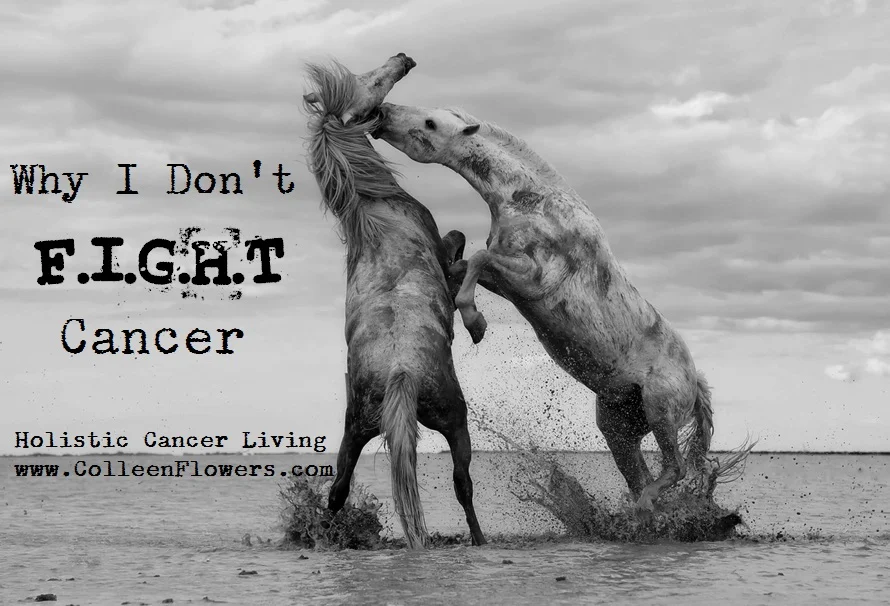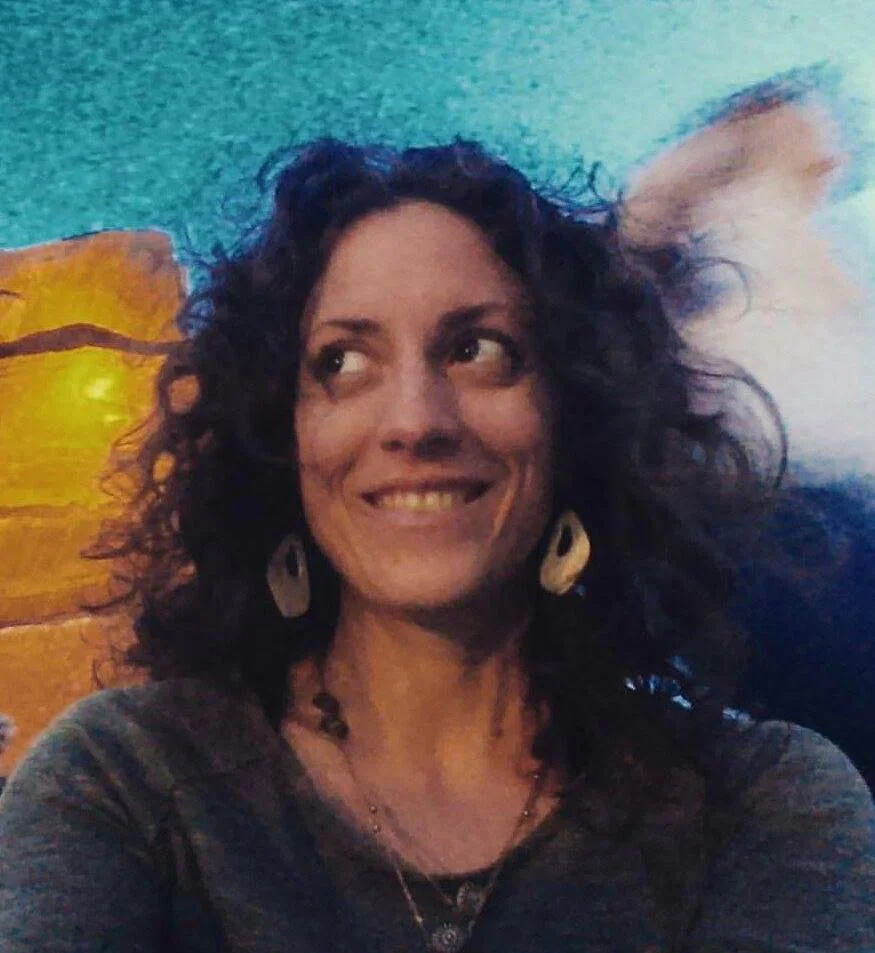Why I Don't "Fight" Cancer - Part 1
/Fighter. Survivor. Victim.
Battle. Struggle. Win. Lose.
Killer. Conquer. Weapon. Enemy.
Invade. Attack. Fight. Survive.
Defeat. Defend. Bombard.
Surveillance. Rogue.
Hostile. Uncooperative. Aggressive.
Beat. Hit. Kick.
About 18 months after the diagnosis of aggressive breast cancer, I was sitting in the waiting room at my GYN's office for my annual appointment. I recognized a woman that I hadn't seen in a few years and said hello to her. After a minute of chit-chat, she said, "Oh, and I heard you were battling cancer. How's that going?"
Battling? The word caught me completely off-guard. I had immersed myself, as much as possible, in a bubble of love since the first day of diagnosis and the thought that I was engaged in battle with something or anyone was completely foreign to me.
The War on Cancer
I don't know about you, but I don't identify with much of the militaristic language surrounding cancer, most especially The *War* on Cancer. I think it has something to do with being raised in the Mennonite tradition of pacifism; being a dirty, tree-hugging, peace-loving hippie; and trying to walk Christ's example of turning the other cheek.
I've never seen myself battling or fighting cancer. I don't see myself as a warrior or a survivor. I do not believe that cancer is my enemy but if it were, I'd follow Christ's command to love my enemies.
That being said, I totally get that we're all so different. If being a fighter and kicking cancer's ass works for you, great! Keep it up! Disregard this post.
If, on the other hand, you haven't really found yourself embracing the imagery of a life on a battlefield, I just want to say, "You're not alone. Me neither." I like using the term "cancer thriver" and the image of being on a "journey" instead.
That Time I Did Wage War...
In 2006, 9 years before the breast cancer diagnosis, I found the first of many benign lumps in my breasts. And at that time, I waged an all-out war on that fibroadenoma tumor. From acupuncture to herbs to various supplements to zero caffeine consumption to increased brassica veggie chomping to bouncing on a rebounder, I was hell-bent on destroying. that. tumor.
By 2008, it had become a "giant" fibroadenoma and required surgery. After I woke up from the operation, I changed my tune. If war didn't work for blasting that tumor away, I was going to use love instead. I welcomed each new cyst and lump for whatever purpose it was serving; I spoke to them and said they could stay as long as was necessary in an atmosphere of love. This path of making and keeping peace feels so much better to me.
Words
When my then-husband and I met with 2 different surgeons just 2 days after the diagnosis of aggressive breast cancer, we were both surprised to hear both of these women use masculine pronouns when referring to the cancer tumor.
"He's about a centimeter right now."
"The surgery will remove him and the surrounding tissue."
"This little guy is growing really fast."
Both he and I (my ex-husband and I, not the cancer and I), were taken aback that these highly educated women were both using a personal and masculine way to describe the cancer. As if there isn't already a *war* of the sexes going on, now they were putting the idea in my head of this destructive little man growing inside my breast?! No thank you.
I've changed a lot of the words that have been said to me by various health care providers along the way.
They call them "rogue" cancer cells... if there are any, I call them wandering cancer cells instead.
They say they have me "under surveillance"... I say they they're keeping a loving eye on me instead.
They tell me the various supplements I'm taking are excellent "weapons" to "attack" cancer... I pray that the pills I swallow vibrate at the exact frequency of healing that is best for my body instead.
They recommend that I avoid sugar to "defend" cancer from returning... I remind myself how "yucky" my body feels whenever I eat too much sugar and that I'd rather feel "good" instead.
They report that the cancer is "aggressive"... I respond with compassionate or non-violent communication like the Wu Wei perspective from the Tao:
"The Wu Wei approach to conflict-solving can be seen in the practice of the Taoist martial art Tai Chi Chuan, the basic idea of which is to wear the opponent out either by sending his energy back at him or by deflecting it away, in order to weaken his power, balance, and position-for-defense. Never is force opposed with force; instead, it is overcome with yielding. [...] The Wu Wei principle underlying Tai Chi Chuan can be understood by striking at a piece of cork floating in water. The harder you hit it, the more it yields; the more it yields the harder it bounces back. Without expending energy, the cork can easily wear you out. So, Wu Wei overcomes force by neutralizing its power, rather than by adding to the conflict. With other approaches, you may fight fire with fire, but with Wu Wei, you fight fire with water." (The Tao of Pooh by Benjamin Hoff)
The Evidence
So, as much as this might sound like a bunch of woowoo and hippie hocus-pocus, it's also been studied by fancy researchers who used a tool called the "meaning-of-illness measure."
If after a diagnosis of cancer you want to have:
lower levels of depression and anxiety,
a higher quality of life,
lower pain scores,
and higher coping scores,
then the evidence says to view cancer with a more positive meaning, such as a "challenge" or having "value."
“Studies that have interviewed cancer patients around the time of diagnosis and followed them for years after have found that patients who view their disease as an ‘enemy’ [and ascribe a negative meaning of illness with choices such as ‘loss’ or ‘punishment’] tend to have higher levels of depression and anxiety, and poorer quality of life than those who ascribe a more positive meaning. They also tend to report higher pain scores and lower coping scores.” (NCBI study and The Atlantic article)
This isn't the same as resigning yourself to a prolonged or fatal illness. "Healing is a creative act, calling for all the hard work and dedication needed for other forms of creativity" (Bernie Siegel). There's still work to be done, but it's the work of building a life that you love to live instead of the work of focusing on and destroying all of the negative things around you.
“The state of the mind changes the state of the body by working through the central nervous system, the endocrine system, and the immune system. [...] Peace of mind sends the body a ‘live’ message, while depression, fear, and unresolved conflict give it a ‘die’ message.”
So if you waging war isn't something that you want to do, then don't. I invite you to send love and light to cancer cells instead. If you're freaked out that this would cause them to grow more, wise people on the path ahead of us have told me that it doesn't do that; quite the opposite, it can change them back into healthy cells. ♡
Colleen Flowers was given the diagnosis of aggressive Stage 2 breast cancer on June 1, 2015 at the age of 35. She's trained as a Holistic Reproductive Health Practitioner and does her best to walk the talk. Please explore this site for resources, information, and ideas you may not have been presented with before now. If you like what you see, then subscribe to her newsletter and consider talking with her. Want to stop making decisions based on running away from fear and death, and base them on walking toward love and life? Book a Consult and Buy a Package for individualized coaching support.




